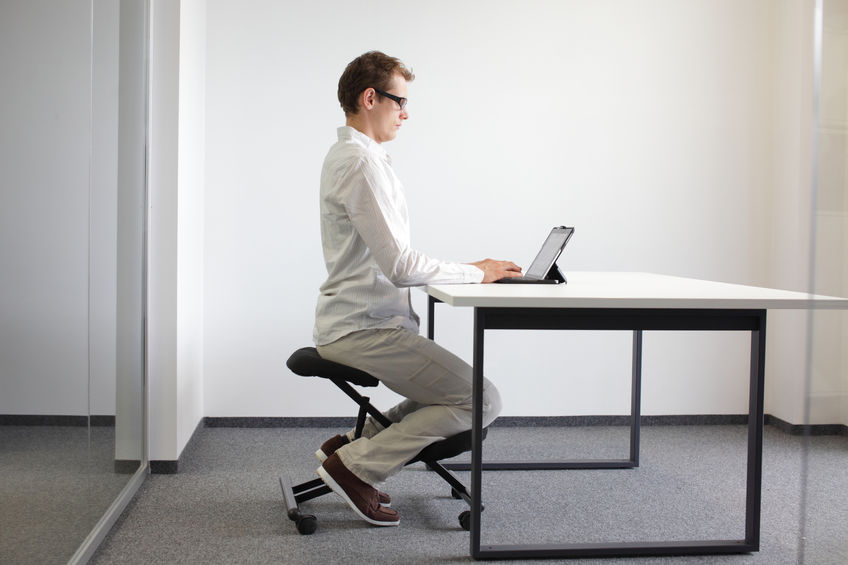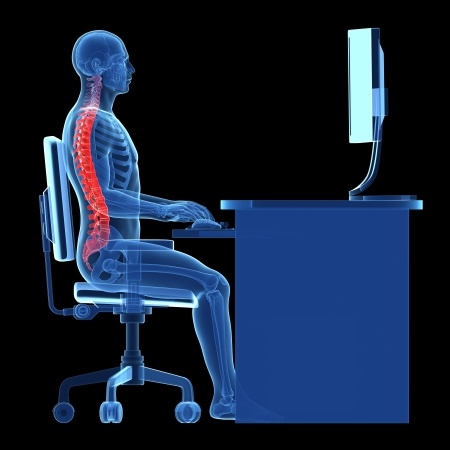What are Ergonomics?

Tid Bits of Info
- Consult a Physical Therapist for Ergonomic strategies if you are worried about your work place set up.
- Protect yourself by changing positions often throughout the work day.
- Performing the same task repetitively throughout the day will assuredly cause you pain at some time in your career.
- If you develop pain when performing a work task, initially treat is with the RICE principles of acute injury management.
- Your Physical Therapist can educate you on ways to avoid injury while performing a specific job.
All of us can benefit from the science of Ergonomics. In work, school and daily life, proper ergonomics can help create a safe work environment and eliminate injuries that can occur when the human body is placed in improper anatomical positions.
Defining Ergonomics
What are Ergonomics? The word is derived from the Greek language, Ergon, work, and nomos, law or principle, which can be translated into “principles of work” or “science of work.” Ergonomics addresses physical and environmental issues. It attempts to prevent awkward postures, body movements, and excessive stressful or repetitive motions. It also addresses the environment of the work place to eliminate extremes of heat, cold, visibility issues, noise and vibration.
Ergonomics is a science that has evolved since the beginning of time and was given a specific name over 100 years ago. The study of Ergonomics has proliferated over the past 20 years due to the increasing cost of healthcare for the injured worker. By employing proper Ergonomics in the workplace, companies can reduce work related musculoskeletal disorders, repetitive stress injuries and repetitive motion disorders.
An injured worker is a large expense to a company. The cost of healthcare, lost time and production at work as well as a weakened work force due to the need to “fill the position” are some of ways that improper ergonomics hurt a company. When the workplace is adapted through the science of Ergonomics, it reduces the frequency of workplace injuries.
The Science of Ergonomics
The science of Ergonomics studies the way people move and perform different tasks. By studying the way people reach, grasp, carry, push, pull, release and lift scientists can determine how to modify and adjust the work station to eliminate abnormal stresses and strains on the body. When the adjustments are made, the workplace is safe and enables the worker to be more efficient. When the task at hand is observed, the scientist will consider body motions, visibility, expected workload and any other aspect of the job that might affect the quality of production. Unnecessary movements, awkward postures and poor visibility can lead to an injury and reduced work production.
Ergonomics stresses productivity, quality and safety in the workplace. If any of these are compromised, the cost of operating a business will rise. The science of Ergonomics has helped to stimulate the economy in many ways. Different apparatus, tools and machines have been invented to make certain jobs easier and less taxing to the human body.
Physical Therapy and Ergonomics
Physical Therapists routinely discuss Ergonomics with some of their patients to help prevent injuries, increase safety and improve efficiency. Every day we engage in a series of repeated actions as a part of our normal routine. Some of our actions are inefficient and may risk overuse injuries.
The human body must remain in proper postural positions to prevent injury. Our regular spatial movements must not compromise the anatomy. Anyone can attest to the fact that they can perform better if they are comfortable and not experiencing pain in any part of their body. Physical Therapists and other healthcare professionals can teach clients how to perform different activities while maintaining proper posture, thus eliminating injuries and improving efficiency.


























I completely agree, are a huge help for iomipvrng a patient’s functionality at their computer workstation. The Visual Ergonomics link in the main article talks about using computer glasses to alleviate asthenopia or eye strain at the computer. I have also included the link again at the beginning of this comment. Thanks for the comments.